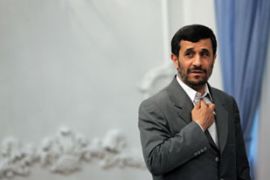The Venezuelan government of Hugo Chavez was accused of failing to co-operate with US anti-terrorist efforts, the report said.
The report also said attacks by fighters in Afghanistan rose by 16 per cent between 2006 and 2007 partly because of rise in al-Qaeda activity in neighbouring Pakistan.
The US said that al-Qaeda had built up its operations in Pakistan’s tribal areas over the course of the year.
Al-Qaeda ‘reconstituted’
The US said attacks in Iraq dropped slightly between 2006 and 2007 but they accounted for 60 per cent of worldwide terrorism fatalities.
|
|

First US state department report on state sponsors of terrorism was published in 1979.
Libya, Syria, Iraq and South Yemen were named on the inaugural list.
South Yemen was removed after it merged with North Yemen in 1990.
Iraq was taken off the list in 2004 after the US invasion.
Libya was removed in 2006 after reaching agreements with the US over its “commitment to its renunciation of
terrorism”.
Iran, Syria, North Korea, Cuba and Sudan on current list
|
More than 22,000 people were killed in attacks around the world in 2007 – eight per cent more than in 2006, although the number of actual attacks fell, the report said.
The US said al-Qaeda remained the greatest threat to its security despite ongoing efforts to combat the group.
“It has reconstituted some of its pre-9/11 operational capabilities through the exploitation of Pakistan’s Federally Administered Tribal Areas, replacement of captured or killed operational lieutenants, and the restoration of some central control by its top leadership, in particular Ayman al-Zawahiri,” it said.
The main reason for its resurgence was a ceasefire the Pakistani government reached with tribal leaders in the region last year, the report claimed.
That truce has since ended but Pakistan’s new government is now negotiating a similar agreement that some in the US fear could further undermine efforts to battle al-Qaeda.
The earlier ceasefire and instability appear “to have provided al-Qaeda leadership greater mobility and ability to conduct training and operational planning, particularly that targeting Western Europe and the United States”, the report said.
However, Conn Hallinan from the Institute for Policy Studies told Al Jazeera that the report gave a misleading picture of global conflicts.
“The US has elevated asymmetric warfare into some sort of organisation when it’s a series of insurgencies that are very different – what happens in southern Lebanon is not what happens in Iraq,” he said.
The report, published annually, gives an overview of what the US calls terrorist attacks worldwide.

